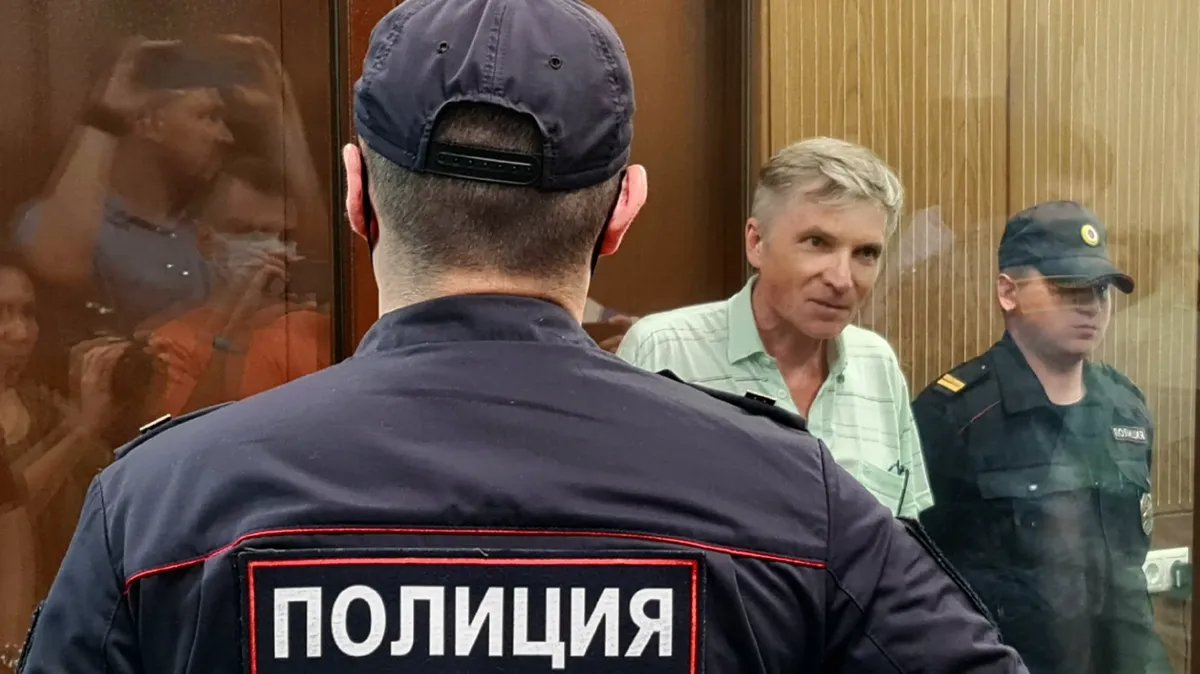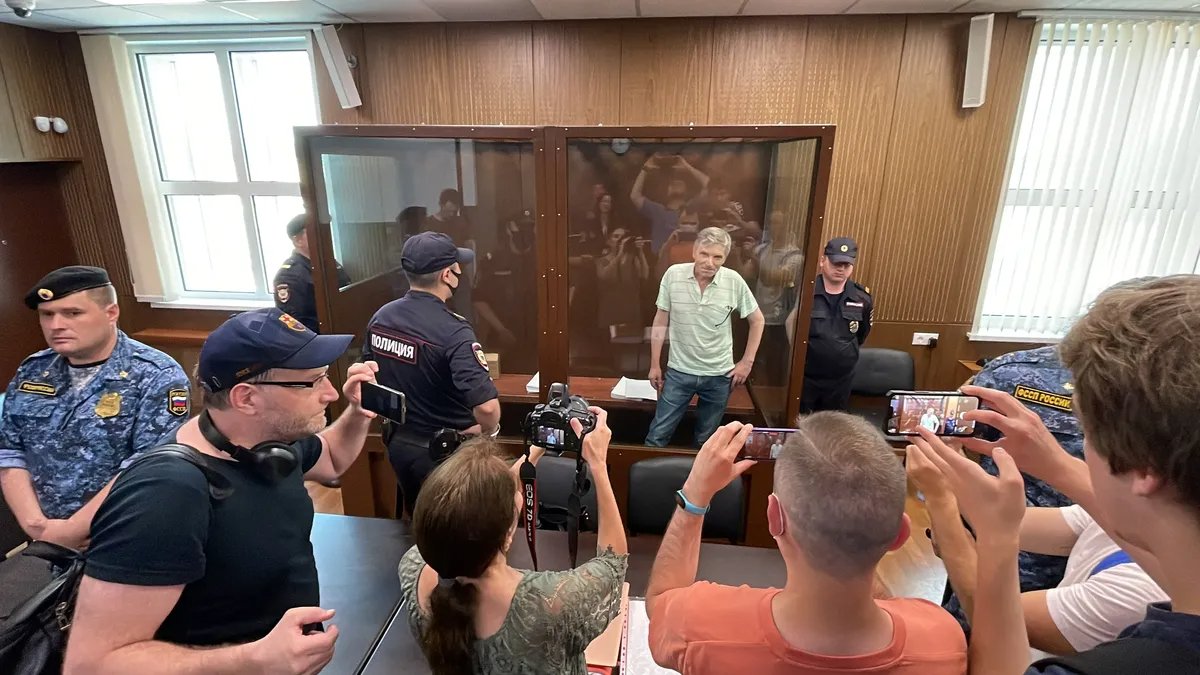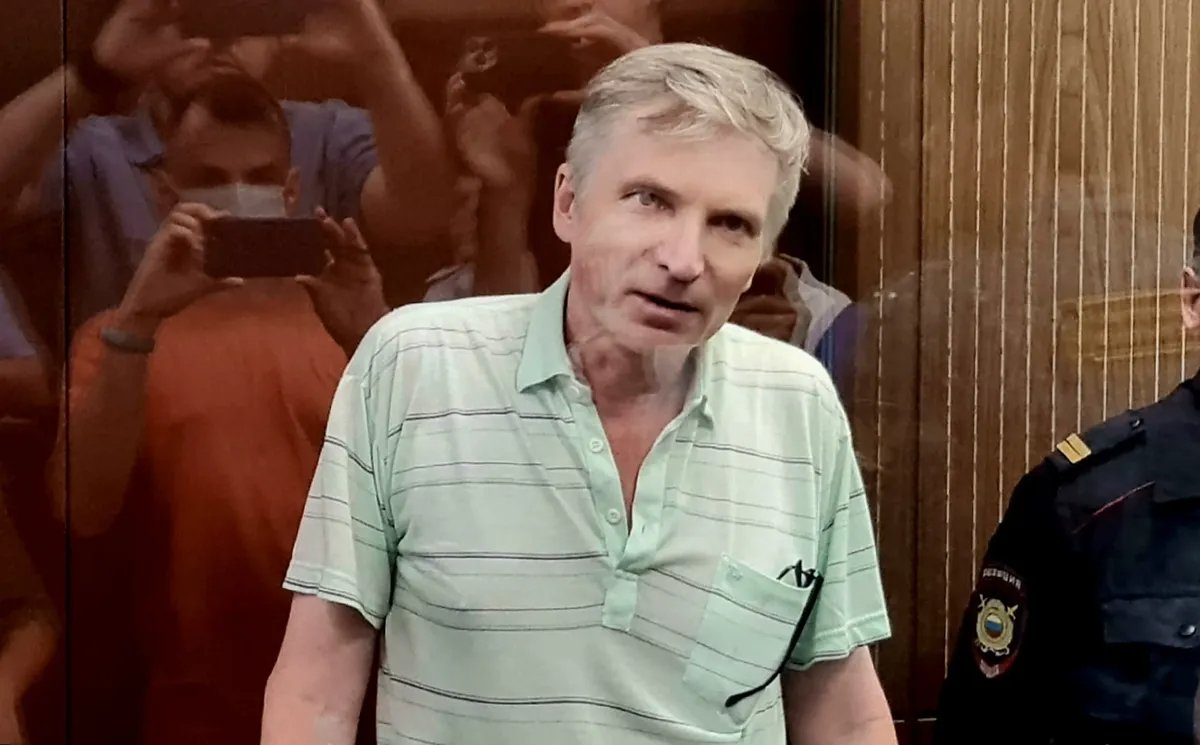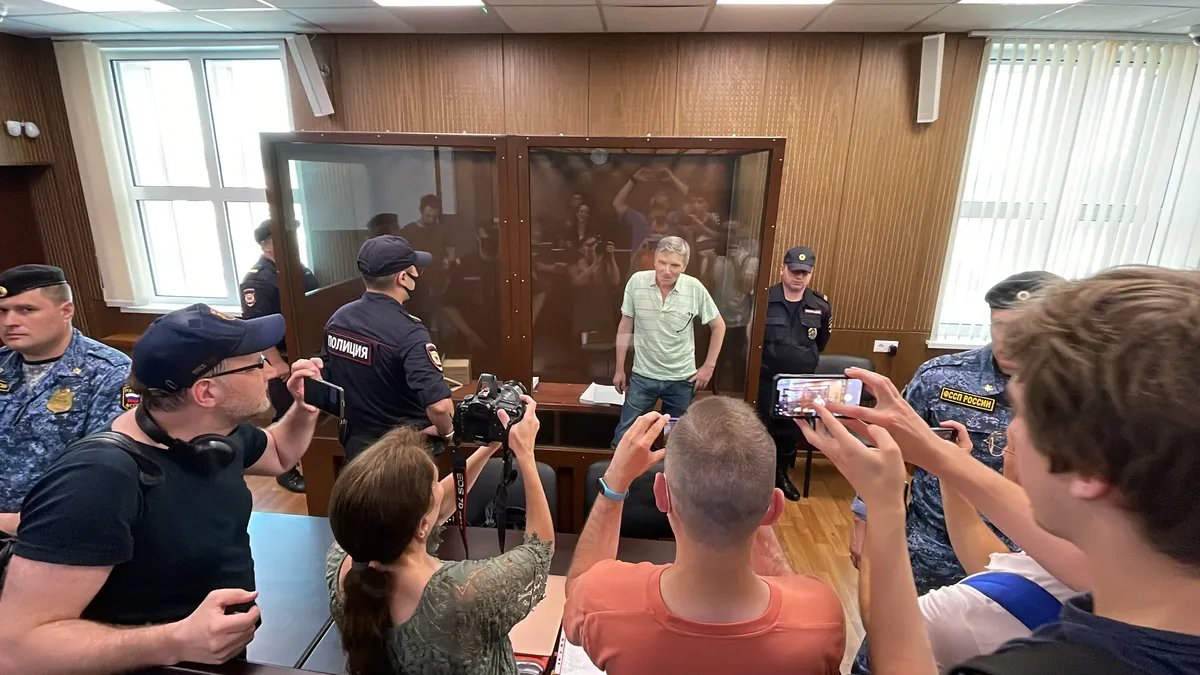Alexey Gorinov, a Moscow legislator, has become the first person to be sent to prison for “spreading fake news about the Russian army.” He will spend seven years in prison literally for believing that any war is a bad thing and that killing children is horrible — and, of course, for referring to Russia’s invasion into Ukraine as “war” instead of “a special military operation” as the new oppressive law prescribes.
Gorinov’s defence suggested that the justice follow “a civilised path” to decide this case by appealing to the Constitutional Court and check if this law complies with Russia’s Constitution. The judge and the prosecutor opted for a different way, declaring that having an opinion that contradicts the official policy of Russia’s Defence Ministry is horrible villainy which should be treated as a violent crime.

Alexey Gorinov in the courtroom. Photo by Andrey Karev
Gorinov was detained on 26 April and sent to a pre-trial facility the following day. It took the Investigative Committee five days to investigate the case. Only three court sessions were held during the trial, while the prosecutor’s office spent no longer than a couple of hours presenting the evidence. Gorinov was found guilty of “malfeasant spreading of fake information in a group on grounds of hatred and hostility,” Russia’s Criminal Code Article 207.3.
The prosecutor’s theory says that Gorinov, alongside fellow legislator Yelena Kotyonochkina, made several statements which “contained fake information regarding Russia’s armed forces” during a council meeting on 15 March. Gorinov referred to the invasion of Ukraine as to “war” rather than “a special military operation” and spoke about the murdered Ukrainian children. These statements, the prosecutor believes, contradicted the Defence Ministry’s official stance, and helped Gorinov and Kotyonochkina “delude the public at large.” A video recording of the meeting was posted on YouTube. Kotyonochkina also faced criminal charges, but managed to leave Russia before being arrested and is now on the international wanted list.
Dozens of people gathered around the courtroom when Gorinov’s verdict was pronounced on 7 July to support him. The courtroom was too small to fit everyone; Gorinov’s supporters requested relocating the trial to a different room or setting up a video broadcast, but their appeal was ignored.
“The detention facility where I am held now is located about 450 yards from a military research institute, my first workplace. Decades ago, I was passing by this detention facility as I got to work every day. I never expected to get inside,” Gorinov said before the court session began.
A civilised way for a district court to follow
Olesya Mendeleeva, the judge, started the session by giving the floor to Gorinov’s defence to hear their reasoning. Katerina Tertukhina, Gorinov’s defender, petitioned in favour of suspending the case and addressing the Constitutional Court in order to check if Article 207.3 follows the rule of law. “This article is a danger to both ideological and political pluralism,” she said.
Introducing criminal liability for spreading information which the authorities find “false” or “fake” is but infringement of freedom of speech, which is secured by the Constitution. The article, as Tertukhina believes, was introduced to suppress political pluralism and ideological dissension. The State Duma, Russia’s parliament, created this law in order to “protect the country’s servicemen from any criticism.” This contradicts Article 55 of Russia’s Constitution which lists the grounds for limiting the citizens’ rights.
Moreover, criminal persecution of people for their public statements is unacceptable. Such reaction to criticism is a threat to public dialogue which prevents citizens from regulating the public bodies of power. The defence also applied to release Gorinov from the detention facility for as long as the case would be potentially considered by the Constitutional court.
“It would seem a civilised way for the district court to follow,” the defendant said.

Alexey Gorinov in the courtroom. Photo by Andrey Karev
The judge wasted no time and turned down the appeal, saying that she sees no ground to address the case to the Constitutional Court and suggested that the defence team does this themselves.
Gorinov then asked for the judge’s recusal and called her actions “unlawful” since she turned down all his appeals during the trial with no legal grounds. The judge shot a grin at Gorinov and left for the chambers.
“I did all sorts of medical checkups, my brain is doing pretty good, there’s no beating me at chess,” Gorinov was joking during the session break. He was in good spirits during the trial and even cheered up his supporters and his wife. The police escort were finding this annoying.
“I had no doubt you would take all this easy,” Tertukhina says to him with a smile on her face. “But your relatives amaze me, they are reading books during the break as if nothing is happening...”
“My son is a scientist, yet he is forced to waste time here with me,” Gorinov responds.
The judge came back from the chambers after a few minutes and turned down Gorinov’s recusal. She then requested the defendant to provide testimony. Gorinov said he had a dream on 22 February where he saw everything that is happening in Ukraine now. The next day he wrote a letter to Sergey Shoigu, Russia’s Defence Minister, convincing him a potential war would lead to no good. On 24 February, the day the invasion began, Gorinov learned that a group of people was gathering for a rally in the heart of Moscow to protest the invasion. He was going to arrive at the spot after work and then visit a police station to provide legal advice for the detained; but was detained himself as a result.
“I am a reasonable person and there’s no way I can support what’s happening.” He then addressed the judge: “You are a woman, this means you must be against the war, too...
I was sentenced to a 30-day long detention in a court session that lasted a couple of minutes on 25 February. And then the decision was cancelled, and I was released.”
Gorinov said he had been unaware of what was going on in Ukraine until he was released on 11 March. A local council meeting Gorinov was expected to take part in was scheduled for 15 March. The meeting was expected to discuss a leisure programme for the local community. During the meeting, Gorinov suggested that a drawing competition for children be cancelled. He later said his speech at the board meeting had been edited and retold incorrectly.
“There’s no way we can have fun now that our way of living has changed, now that our country has aggressively attacked a neighbouring country. Why do you think it’s possible to set up a drawing competition for children when kids in Ukraine are dying each day?”
The majority of the legislators turned down the offered programme just as Gorinov proposed.
“Did your statements during the council meeting reflect your personal opinion and represent your beliefs?” the judged asked Gorinov.
“Absolutely. After I shared my opinion, there was a discussion among the council members, which I did not take part in.”
“Did you discuss your attitude towards the special military operation with anyone else? With Kotyonochkina, for instance?”
“No, but everyone there is aware of what my attitude is.”
“You said you were unaware of the world news when you were in custody, how did you find out anything about the murdered children then?”
“I learned all this during the weekend after I had been released.”
“Do you know what the goals of the special military operation are?”
“I know what the officials say. But I just can’t say it out loud, it’s nonsense...”
“For what reason did you make the statements you are accused of?” Svetlana Zhuravlyova, the prosecutor, asked Gorinov.
“I did it within the boundaries of my competence regarding the leisure programme plan.”
After this, the judge asked the defence witnesses to provide their testimony. They described the defendant as a responsible legislator who was always there to help the community with their issues. Milkhail Biryukov, another legislator from the same district who was present during the council meeting on 15 March, told the justice that there is common worldwide practice of never persecuting legislators for their statements made during official events.
“Legislators always share their personal opinion when they vote on a particular matter,” Biryukov said as he confirmed that Gorinov had been expressing his attitude towards the leisure programme.
Tertukhina then appealed to attach the documents which led Gorinov to believe that the Ukrainian children were being killed to the case. The defence referred to an “informational message of 12 March 2022 containing data on 79 deceased children used by the United Nations Human Rights Office”.
Surprisingly, the judge satisfied this motion and attached the documents to the case. However, she dismissed the motion to interview the forensic experts who provided a psycho-linguistic examination earlier during the investigation. “The first examination proved my innocence, but that did not satisfy the detectives, so they made up another examination in just four days, and my message had been distorted,” Gorinov noted.

Alexey Gorinov in the courtroom. Photo by Andrey Karev
Naturally, the judge satisfied the prosecutor’s motion to interview the experts involved in the second examination. Igor Ogorelkov, a forensic linguist, analysed the recording alongside his colleagues and compared it to one of the official statements made by the Defence Ministry. The experts declared that the defendant’s stance indeed contradicts the one of the Defence Ministry’s. A psychologist also involved in the examination confirmed that the defendant had not called for any violent action, used rhetorical questions as a stylistic device and other means of psychological action in order to provoke sympathy for Ukrainians.
War is a disgraceful thing, no matter what you call it
The court session lasted until late in the evening. When the two sides finished with their reasoning, the judge scheduled the oral argument on the same day, leaving an hour’s time for preparations. Prosecutor Zhuravlyova started the argument, saying that Gorinov’s guilt had been proven by the testimony of the prosecution witnesses, a video recording from the council meeting, the evidence provided by forensic experts, and other materials. She asked for a guilty verdict for Gorinov and requested a punishment of seven years in a medium-security prison.

Photo by Vasily Polonsky
The judge then suggested that Gorinov take part in the argument, which confused him as he did not know what to start with. The suggested punishment shocked him deeply. Tertukhina took the initiative and started speaking instead of her client. She reminded the judge that there was great responsibility upon her since the case was an unprecedented one: nobody had been sentenced to a prison term on this article before; this would inevitably attract a lot of attention to the case. “The defence has no doubt that Gorinov should be acquitted of all charges since he simply shared his own opinion rather than “spread false information.”
My client is forced to explain that fire is hot, winds do blow, water is wet, ice is cold, and a person who woke up on 24 February and read the latest news could be shocked and could yell something like “Jesus Christ, what on earth is going on!” Tertukhina said emotionally.
She also mentioned that Gorinov’s words had been distorted by the detectives and noted that the prosecutor had not been specific as to which words said by Gorinov are considered legal elements of crime. “No matter how many people will be sent to prison on this article, there’s no way to bar people from feeling emotions and having their own opinion,” she said.
Gorinov then gathered his wits and noted that he was indeed forced to explain obvious things such as the fact that “any war has its victims” and read aloud an extract from A Time to Love and a Time to Die, a novel by Erich Maria Remarque.
“Here they were mangled, crushed, mutilated, singed, and roasted. Scraps of clothing still hung on them; an arm of a woolen sweater, a dotted dress, one leg of a pair of brown corduroy trousers, a brassière in the wires of which hung bloody breasts. To one side lay a nest of dead children, every which way. They had been caught in a cellar that was not strong enough. Single hands, feet, trampled heads with a little hair, twisted legs; in the midst of this a schoolbag, a basket with a dead cat, a very pale boy, white as an albino, dead without a wound, stretched out as though he had not yet lived and was waiting to be animated, and in front of him a corpse burned black, not very deeply but quite uniformly except for one foot that was only red and covered with blisters. It was no longer possible to tell whether it was a man or a woman; the sex and the breast had been burned away. A gold ring gleamed brightly on a black, shrunken finger.”
The judge and the prosecutor looked down as Gorinov recited the book and appeared emotionless.
He was requested to make his last plea just as he finished. Gorinov’s defendant asked if she could speak to her client for five minutes.
“Go on, talk and then do whatever you want,” the judge said before leaving the courtroom.
“I’ve been looking at the judge the whole day, she was texting someone all the time... what the hell is that?” Gorinov, making a helpless gesture.
“If someone told me 30 years ago that I would be sentenced for speaking up, I would not believe it. The reason why our society has come to this is a tragic one, and it will require in-depth analysis and conceptualisation in the future. This is going to be tough, but we’ll have to realise and admit that a war is a war. We will also have to exonerate the victims of this nonsense, as well as to punish the criminals who made this happen.”
The verdict
Mendeleeva, the judge, announced that the verdict would be pronounced the following morning before she left for her chambers. The huge courtroom and the corridor leading to it was packed in the morning. Gorinov was escorted to the courtroom with his hands cuffed. He raised a poster which read “do you still need this war?” The session was delayed for two hours. A police officer announced that anyone caught recording the verdict pronouncement would be treated as an offender and evicted from the courtroom.
“How much for a photo then, 500 rubles (€8) fine?” someone asked sarcastically.
Then Mendeleeva entered the courtroom and started to pronounce the verdict. It became obvious the verdict was a guilty one right away. Gorinov listened to the verdict, looking in front of himself through the glass of his cell, Tertukhina leaning against the glass. His relatives sat on the front bench and tried to cheer him up.
“Gorinov committed a premeditated crime and was aware of its public danger, causing the general public to feel anxiety and frustration,” reads the verdict.
All prosecutor’s pleas were accepted while all pleas made by the defence were ignored. The judge said Gorinov had committed a grievous crime and can only achieve redemption in a penal institution. Tertukhina could not hold back tears. Before the exact prison term had been announced, a break was made to allow cameramen into the courtroom. The people in presence gave Gorinov a standing ovation. The police then evicted everyone from the courtroom, only allowing Gorinov’s relatives and news reporters to stay.
After the break, Mendeleeva sentenced Gorinov to seven years in prison and forbade him from taking up any state positions for four years.
“Do you understand the court’s decision?” the judge asked Gorinov in a formal manner, shuffling her papers around the table.
“Yes, but I’m surprised how harsh the decision is.”
Join us in rebuilding Novaya Gazeta Europe
The Russian government has banned independent media. We were forced to leave our country in order to keep doing our job, telling our readers about what is going on Russia, Ukraine and Europe.
We will continue fighting against warfare and dictatorship. We believe that freedom of speech is the most efficient antidote against tyranny. Support us financially to help us fight for peace and freedom.
By clicking the Support button, you agree to the processing of your personal data.
To cancel a regular donation, please write to [email protected]
